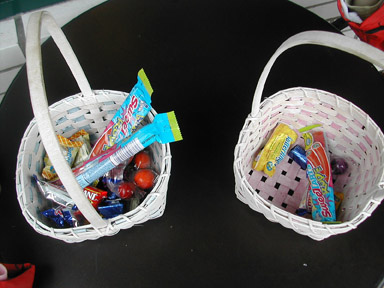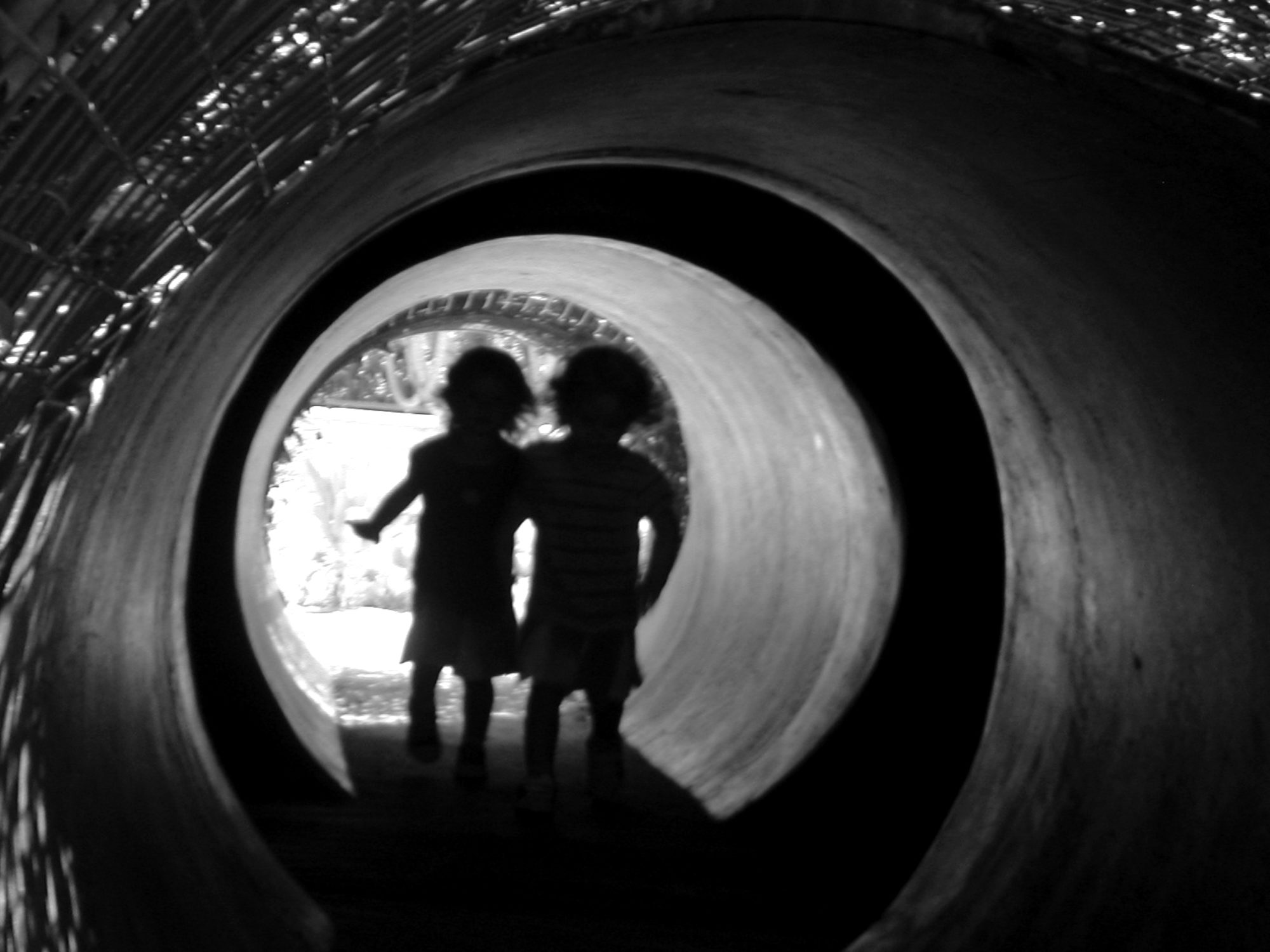“On the math of multiples:” A triplet mom-to-be and journalist writes about her experiences so far in Canada’s National Post.
TwinWatch News: Separating twins in school bill receives hearing
According to an article in the Portsmouth Herald online, New Hampshire’s Senate Bill 78 received a hearing in the state’s legislature Wednesday. The bill gives parents a say in determining whether their multiples will be placed in the same classroom. Note that the original bill gave parents final say, but the bill, in its current form, gives allows school principals a say, with an appeal process for parents.
Finding the golden egg
Last year I wrote about the “anxiety of the mom at the hunt” and discussed my thoughts about stacking the deck for success at my girls’ first Easter egg hunt.
It turned out that the deck was already stacked by the generous fire fighters in town. No kid at our local egg hunt could possibly go away empty-handed.
This year, Dinah and Djuna are aware of what an egg hunt is, so I had to explain that in our park hunt, there aren’t really that many eggs to find. I told them that there is candy to collect everywhere instead of having lots of hidden eggs. There are actually a few golden eggs to find, but there are only a few and most of the hundreds of kids at the hunt won’t find one.
But Djuna was very excited to find a golden egg. At the hunt, Djuna really wanted to find a golden egg, and Dinah focused on gathering candy.

At one point, we passed a family with a little just-walking toddler, and they found a golden egg in the damp grass just as we were passing. I called Dinah and Djuna over so they could at least see a golden egg. This only made Djuna more determined.
As soon as we moved away from the golden family, my friend ran over to me (Auntie Lisa a.k.a. “Sleesla;” she sweetly braved the rain to come Easter Egg hunting with us) and told me that the family had actually brought their own golden egg.
Brilliant, I thought! What a fun and innocent way to let a little one have some fun than to let them find a home-brought golden egg over and over again. Parents’ ingenuity never ceases to amaze me.
I don’t think I could have pulled this over on my kids, because they knew that people were bringing the eggs up to the fire fighters at the microphone to redeem them for big Easter baskets.
But that’s OK. We went up to the head of the city’s Volunteer Fire Fighters’ Association and asked to touch one of the golden eggs. Djuna liked that just fine. Dinah shook the Easter bunny’s hand while Djuna panicked, and once again this year, a good time was had by all.
TwinWatch News: More about possible single-embryo transfer restrictions in UK
A detailed article about the implications and concerns if the UK were to enact a single-embryo transfer policy for IVF procedures.
TwinWatch News: Britain may limit number of IVF embryos, and lots more news about multiples
I’ve gotten behind posting the news (sorry!), but there have been a lot of interesting articles lately, so here’s a quick run-down:
The top story today is about the possibility that women in Britain may soon be restricted to the implantation of one embryo during an IVF procedure. Currently, there are strict rules that restrict women under 40 to two embryos at a time, while women over 40 may have three. From the article:
The move to cut the number of embryos implanted follows research showing that multiple births are not only costly but put a mother’s health at risk and lead to a higher rate of disabilities in babies.
Twins and triplets are more likely to be born prematurely and be underweight. Triplets, for instance, are typically born at 34 or 35 weeks. There is also a greater risk that babies will be stillborn or suffer a long-term disability such as cerebral palsy.
Research from Sheffield University showed that families conceiving triplets by IVF cost the NHS £32,354 in their first year of life – 10 times the cost of a single baby – because of the health complications suffered by the mother and children. Currently, the twin birth rate is 23.6 per cent for mothers undergoing IVF, compared to between one per cent and two per cent in the general population.
But some fertility experts have warned that a one-embryo policy – adopted in the Netherlands, Finland and Sweden – would deprive tens of thousands of women the chance of having a baby.

The above news about the possibility of a limitation to a single embryo transfer in Britain has run in a number of British publications. Check out this editorial, written by a father of twins.

I love this article about a twinmom speaking up about her public transportation struggles. And, there’s a comment from a British twins club at the bottom of the article.

A very detailed article about the separation-in-school issue and the legislation wending its way through the Georgia legislature.
And, an editorial about the bill.

Article about four-year-old twins, separated in an orphanage in China and adopted by different sets of American parents, are reunited in Disney World.

Fun article about jazz-playing triplet teens.

A school in Mumbai, India has 13 sets of twins. Nice comments at the end of the article about whether to keep twins together in school.
TwinWatch News: Mia Hamm a twinmom
Dodgers first baseman Nomar Garciaparra and soccer star Mia Hamm are now parents of twin girls. The girls were born in Los Angeles on Tuesday, five weeks early.
TwinWatch News: Many IVF patients want twins; human ‘chimera’ discovered
Very interesting article about IVF. I’ve been reading about how many doctors are now encouraging IVF folks to implant one embryo instead of more than one. Apparently this is due to the higher risks for both mother and babes in multiples pregnancies and births. Turns out, according to this Boston Globe article, that many people still want twins because it ensures them of having more than one child.

Researchers have discovered twins who are neither identical nor fraternal; actually, they’re chimeras, a little of both. The twins are identical in terms of their mother’s genes, but they only have half of their father’s genes in common. Read the article on news@nature.com and blog posts in response at LiveScience.com and ScientificAmerican.com.
TwinWatch News: Canada’s first IVF twins turn 25; 50 years of marriage for twins married on same day
Sweet! Twin sisters Grace Stokes and Elspeth Hall, 70, had a double wedding and are now celebrating their 50th anniversaries. They even received a letter from Queen Elizabeth because of their special story. My favorite part of the article:
Elspeth said: “We did think we might have separate ceremonies as we wanted to be married at different times of the year.
“But my dad told us, ‘You came into the house together, so you should leave the house together’ – and that was it’.”

Another anniversary, this one from Canada.com: Colin and Gregory Rankin are Canada’s first IVF twins. They just turned 25. From the article:
In Canada alone, there are now 28 IVF clinics across the country, and the 2004 numbers – the latest available – show that almost 2,000 babies were born through IVF that year.
But for Colin and Greg, who are planning to go on a road trip later this summer to make up for their lacklustre 25th birthday celebration, the significance of their birth is enough to make them a bit philosophical at times.
“Hundreds of thousands of babies are born through IVF every year, and it’s crazy to think we were one of the first,” Colin said.
“But if you think about it, anybody being born and turning out the way they are is a one-in-a-million chance, so I think Greg and I being born is just one out of a billion – just a few zeros away.”
TwinWatch News: Twins in anorexia research study; twin hockey stars; triplet gardeners
Research using twins and other multiples contributes much to the understanding of human behavior. (You can read my interview with a University of Southern California twin researcher here on BeTwinned.com.) This news story gives an example of a pair of twins who are participating in a National Institutes of Health study about eating disorders and genetics. Both twins suffer from anorexia.

I read stories all the time about twins and triplets excelling in athletics. Here’s one about 26-year-old twin hockey-playing brothers Daniel and Henrik Sedin. They play for the Vancouver Canucks.

I absolutely love this story about gardening triplets. At the end of the article, the triplets’ mother gives a series of tips about getting kids interested in gardening.
TwinWatch news: Same classroom legislation in Georgia; new test may reduce number of IVF multiples conceptions
Whew. Be sure to check out this Atlanta Journal-Constitution article about Georgia’s legislature debating a bill that would allow parents to have a choice about putting twins in the same classroom. Don’t miss the comments underneath the article for some fascinating glimpses of ignorance in the electorate. Here’s an example:
Wow. A state law for one complaining mother in one school in one county. Gotyourhandsfull is right. I’ve known many parents of mulitples who preferred to have their children split up to encourage individuality. Where’s their law? This one mandates twins be kept together if the parents want it, but there’s no provision for parents requesting separate classrooms.
A mere 40 days to handle all legislative business for the year, and this nonsense makes it to the floor. The authors of the bill and all committee members who voted to send it on up the ladder should be impeached!
Uh, guess this person misunderstood the part of the bill that states that twins and multiples should be in the same classroom “if the parent or guardian requests” it.
Kudos to Kathy Dolan for bringing clarity to that discussion.
>>>>>>
In other news, researchers from Yale and Canada’s McGill University have made a discovery that may make it possible to determine which IVF candidate embryos have the best possibility of success. This would mean that doctors would only implant one embryo at a time, obviously reducing the numbers of twin and triplet conceptions.
